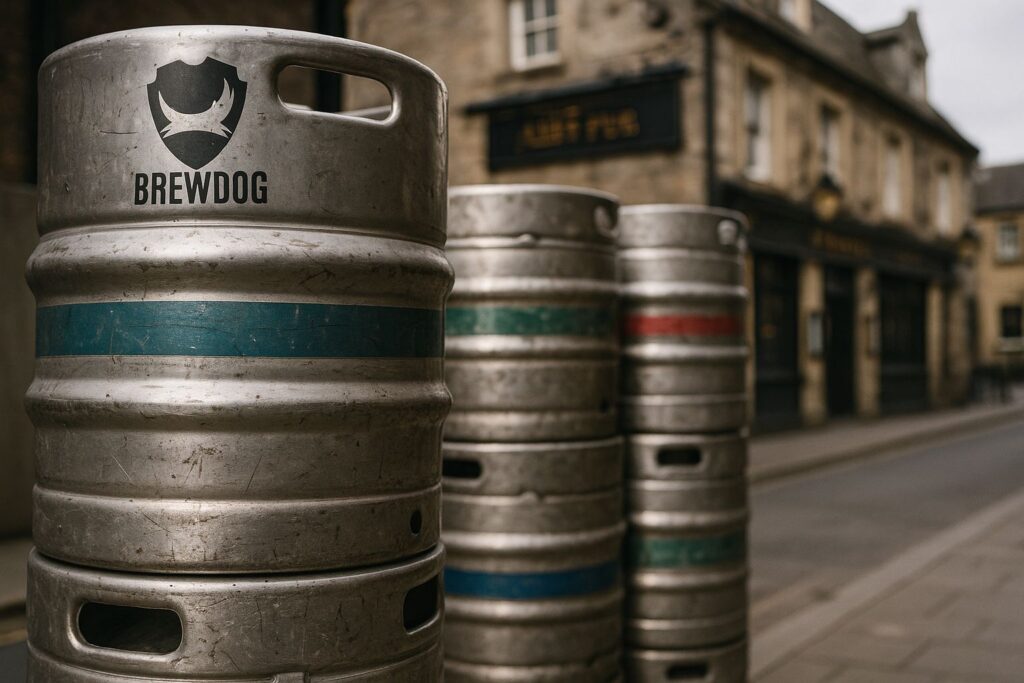
The craft beer giant BrewDog is again in the headlines, but this time for a reason that can shake the presence of its market throughout the UK. About 2,000 pubs have decided to remove the BrewDog beer from their taps and shelves. For a brand that created its reputation when bold, disruptive, and unexpectedly separated, this development is no less than a bitter shock.
BrewDog’s Rise
Brewdog began in 2007 with a rebellious spirit, two men and a dog in a small Scottish city. Over the years, it has become one of the most recognized craft beer brands in the UK. Its beers became domestic names such as Punk IPA and Elvis Juice, which not only attract casual drinkers, but also attract those who want something different from traditional lagers.
The company stood out for its marketing. Stunts such as sending beer into space, drinking the world’s strongest beer, and challenging industry giants gave Budog a unique identity. Customers loved the rebellious attitude, and soon Budogs expanded internationally with bars, hotels, and even a craft beer airline.
However, rapid growth often comes with challenges, and Budog has faced more than a few in recent years.
Why Pub Dropping BrewDog
The decision of about 2,000 pubs is not random to cut the relationship with BrewDog. Reports have suggested a mixture of reasons: pricing disputes, supply chain issues, and stressful relations between the company and pub operators.
Many pub groups argue that the products of the broodogue have become more expensive than other crafts and mainstream beer. With cost-of-living pressures and increasing operating expenses, pubs are looking for brands that balance quality with affordability.
At the same time, small independent liquor-making steps are being taken. Across the UK, microbreweries are offering unique beers at competitive prices, making it difficult for the broodog to catch in one-time place in the pub.
An Alcohol Reputation Problem
Beyond pricing, Budog has been criticized for its own corporate culture. Former employees have accused the company of creating a “toxic work environment“. While Brewdog’s leadership has promised reforms and reforms, the controversy has influenced its brand image.
The owners and consumers of the pub are equally more aware of the stories behind the brands they buy. For some, alignment with Brewdog no longer fits their values, and it has probably played a role in a broad decision to remove its beer.
Impact on Drinkers
For loyal fans, the absence of Braidog beer from their favorite local pubs may be disappointing. One of the company’s leading Bruz, Punk IPA, has been a hit for many beer enthusiasts. Losing easy access to about 2,000 pubs is bound to leave a difference.
However, the drinking is no less of an option. The UK Craft is a view of beer, with local breweries offering fresh, inventive flavors. While Brewdog can have an entry point in craft beer for many people, customers now have many types of options at their fingertips.
What Does This Mean for Brewdog?
Such a large number of pubs to be dropped by Brewdog is a serious challenge for the sale and brand effect. Pubs remain the cornerstone of the culture of British drinking, and losing such visibility can slow the brand’s speed to slow down.
The company will need to ensure its strategies. Cutting prices, rebuilding relationships with pub operators, and repairing its reputation can be the only way. Brewdog’s leadership has always designed the brand to be flexible and fight. Now, the spirit of that fight will be tested more than before.
Could This Be a Turning Point?
Every shock may be a chance for renewal. Brewdog still has a large and loyal customer base. Its straps keep attracting the crowd, and its cans and bottles are available in supermarkets. This means that the company is far from disappearing.
Nevertheless, the message is clear: the landscape has changed. The craft beer movement is no longer dominated by the same name. If Brewdog wants to be relevant, it should be compatible with new realities – how it manages its prices and how it treats its people.
Looking Ahead
The pub industry is highly competitive, and the taste of the customer is constantly developing. While this decision of about 2,000 pubs is a significant shock, it can also spark the brewDog to strengthen itself. The return of its original rebel roots, but with more respect for its employees, partners, and customers, can help in the reconstruction of trust in the brand.
For now, drinkers across the UK may need to detect a new pin on the tap in their local pubs, and who knows? It can also discover the gems hidden in small brookeries.

